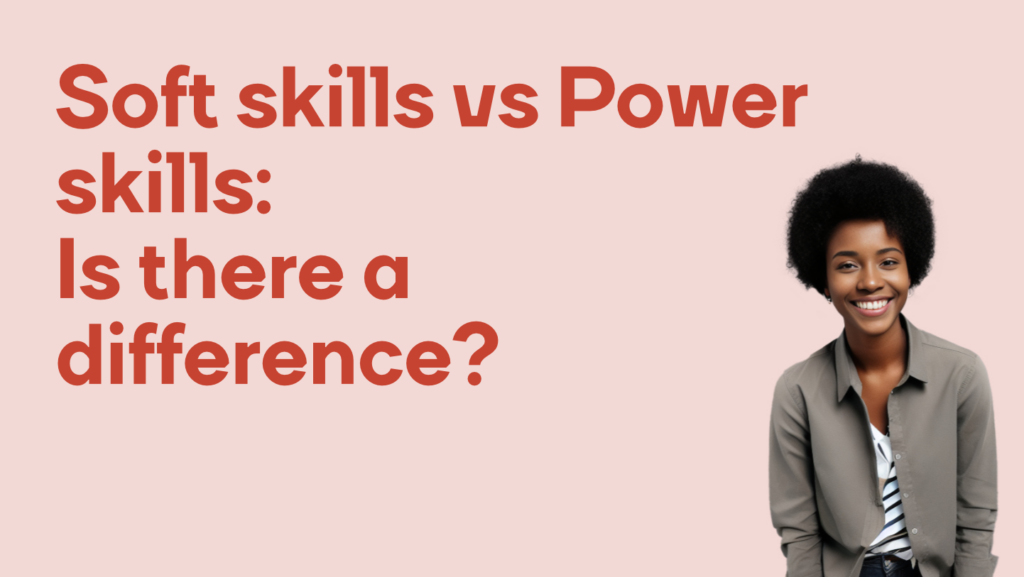HR buzzwords come and go, but some terms have the ability to redefine how we think about the modern workplace. “Power skills” and “soft skills” are two such terms that have gained traction. These terms are often used interchangeably, but are they the same? What exactly are power skills? Let’s take a closer look.

What are power skills, and why are they important?
While the term soft skills emphasizes the contrast to technical hard skills, the term power skills aims to elevate the importance and impact of these non-technical abilities. Labelling these critical skills as ‘soft’ diminishes their perceived value and significance. Power skills amplify the influence and effectiveness of these skills, enhancing one’s ability to drive change, influence others, and navigate the complexities of the modern workplace.
Examples of power skills include:
- Communication
- Teamwork
- Emotional intelligence
- Critical thinking
- Resilience
Let’s delve into these essential skills and why they are necessary in the modern workplace.
Communication
Effective communication is foundational to any organization or relationship. It ensures that expectations are clear, tasks are understood, and objectives are shared. This skill is exercised in various forms: oral, written, non-verbal, and visual. It encompasses everything from presentations and emails to body language and listening skills.
A workforce skilled in communication can significantly reduce misunderstandings, improve project execution, and increase customer satisfaction. Leaders who communicate transparently and effectively instil trust and engagement among team members.
Teamwork
Teamwork plays a crucial role in work-life. This skill manifests in different settings: during meetings, on collaborative projects, and even when helping a colleague understand a complex task. It involves empathy, active listening, delegation, and mutual respect.
Effective teamwork leads to faster problem-solving, more creativity through diverse perspectives, and a more enjoyable, cohesive work environment. It’s essential for daily tasks and long-term successes, as it leverages the team’s collective skills to achieve goals more efficiently.
Emotional Intelligence
Emotional intelligence is the ability to understand and manage one’s emotions while also being skilled at understanding and influencing the emotions of those around you.
Emotional intelligence is indispensable, whether it’s the empathy shown in listening to a team member’s concerns, the self-awareness in understanding how your actions affect others, or the emotional regulation in maintaining composure in high-stress situations.
High levels of emotional intelligence create a more harmonious work environment. It allows for more effective communication, better teamwork, and leadership. Leaders with high emotional intelligence are generally better at motivating their teams, resolving conflicts, and making emotionally sound decisions. Emotional intelligence is crucial to job satisfaction, employee retention, and well-being.
Critical Thinking
Critical thinking is about being able to think clearly and logically and understanding the logical connection between ideas. It’s about being open-minded, curious, and able to reason.
This skill is vital for problem-solving, strategizing, and understanding complex issues. It involves analyzing information objectively, evaluating different viewpoints, and arriving at a well-reasoned conclusion.
Organisations that foster critical thinking are better equipped to navigate the complexities and disruptions of today’s fast-paced business world. Employees who think critically can solve problems more efficiently and make decisions based on thorough understanding and analysis.
Resilience
Resilience refers to the ability to bounce back from adversity or failure and function effectively despite difficulties. It’s about mental toughness and emotional stability.
Resilience is crucial when facing setbacks, stress, or change. Whether it’s a failed project, a lost client, or even navigating the changing landscape due to technological advancements, resilience helps people adapt and move forward. It involves skills like adaptability, stress management, and the capacity for quick recovery.
Resilient teams and individuals can adapt to new conditions and rebound more effectively from failures or crises. Resilience in leadership can inspire and guide a team through challenges, setting the tone for a positive, problem-solving attitude throughout the organisation. It can be a driving factor behind the ability to innovate, as failure is often a stepping stone to success.
In summary, these power skills are interconnected and often feed into each other. For instance, emotional intelligence can contribute to resilience by providing better stress management techniques. Similarly, critical thinking can enhance emotional intelligence by encouraging a nuanced understanding of emotional cues and interactions.
How to Hire for Power Skills
Traditionally, organisations’ hiring practices have focused on evaluating candidates based on hard skills—technical abilities or specific knowledge needed for a role. While technical skills are undeniably important, there is a growing shift towards prioritising power skills in hiring.
Revise Job Descriptions
Start by updating your job descriptions to include essential power skills. Highlight the importance of these skills alongside the technical skills required for the role.
Behavioural Interviews
Incorporate behavioural interview questions that can help evaluate a candidate’s power skills. For example, ask them to describe a situation where they had to resolve a conflict or demonstrate leadership.
Psychometric Assessments
Consider using specialized assessment tools designed to measure interpersonal skills, problem-solving abilities, and other power skills. Psychometric assessments are an effective and objective way to identify these critical attributes in candidates to make more informed hiring decisions.
View the output from Clevry assessments by downloading sample reports below.
Encourage Diversity
Power skills often shine in diverse settings. When you diversify your team, you naturally bring together a wider range of power skills, which can be synergistic and contribute to a stronger team overall.
What’s the verdict?
If you’re acquainted with soft skills, the above probably sounds familiar. So, is power skills just soft skills rebranded, then? In short, yes. But a better recognition of these essential skills was long due. The word “soft” may suggest that these skills are less important, easier to acquire, or less impactful than hard skills like programming or financial analysis.
The rebranding aims to underscore that these skills are not secondary but powerful, essential abilities that significantly contribute to any individual’s or organization’s success. In essence, there is nothing soft about soft skills.



